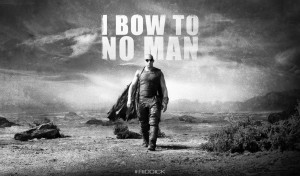Print Edition: September 18, 2013
The worst thing about Riddick isn’t that it is merely bad, but that it demonstrates that director David Twohy’s previous, unexpectedly great film, A Perfect Getaway, is likely an anomaly rather than a sign of better things to come.
Riddick is the third in a “why is this three movies and counting?” sci-fi series focusing on Vin Diesel’s voice, sunglasses, and alien heritage that has mostly shown the ambition of asking if it can be almost half as good as the generation-ago movies it mostly takes from.
Pitch Black was Flight of the Phoenix with a segue into Alien, The Chronicles of Riddick an average SyFy original production with God of War overtones, and Riddick splits the difference, slotting the Furyan one in with mercenaries and the same orange-burnished dust planet look of the series’ opening scenes.
Everyone is always putting knives to each other’s throats in these movies, and to this Twohy (who has also written the series) adds military-jock comic book dialogue, monotonous and deadening over two hours, like Aliens slowed to a crawl. It has time for lengthy scenes where Vin Diesel trains a dog, builds up immunity to a venom, is interrogated, barters, repairs a vehicle, and is teased about his family history. Twohy can’t say too much on the last one, considering there are plans to drag this out into at least one more movie, but perhaps the real question is what the point of this movie is in the first place.
Not a commissioned sequel, a piece of genre hackwork begrudgingly taken on as a necessary job, much has been made of the “freedom” and “independence” of the making of this film. Vin Diesel produced, not a Hollywood exec, and Twohy financed Riddick like an independent movie. The other recent example of this kind of story was the Wachowskis’ Cloud Atlas, but there the case could be made that there was something hubristic, different, and unwatered-down about what was being done.
Twohy opens Riddick with a would-be virtuoso dialogue-less stretch of sun-beaten survival, but it’s more like watching someone else play a video game prologue (Twohy prefers mostly overhead action shots and roving, digital scopes of terrain), and looks pale and lifeless next to John Carter, let alone the great items Twohy seems to want to “explore.” Better to leave the Homeric plot cycle as just another pseudo-great framework sometimes evoked by flailing writers, like Don Draper reading Dante or, to circle back, Riddick pulling a Richard Dawkins on the Bible (it was just as embarassingly superficial when Twohy did the same thing thirteen years ago).
The problem with the sci-fi/fantasy universe isn’t just its boring sameness, its misogyny, its underlying misunderstanding of heroic solution, but its willful immaturity – Twohy, like numerous other directors, has reached a point where he has already made the movie that calls back to his childhood. A bunch of guys, survival, heroism, etc. From here, do they expand upon the same themes, grow into newer ones, rework them as they continue to revise and create? No, the action sequel rejects change, emphasizes endless coming-of-age through violence, and repeats itself. Unlike television series, a movie series rarely even allows for the effect of seeing an actor, if not their material, grow and change with the role—they are replaced, or must stay the same—vibrant, sarcastic.
The best sequel is a bad sequel. Either one so willfully idiosyncratic and against expectation it cannot result in future ones, at least when executives are deciding (Superman Returns, Spider-man 3), or one that follows the old rule of diminishing returns, forcing a director to make something different. The latter happened to Twohy – The Chronicles of Riddick did poorly, and this is the only reason the new one is called “independent” in the trades.
Twohy next made A Perfect Getaway, an unmarketable (by Hollywood standards), lean movie. It’s a 90-minute thriller with elements of Hitchcock and Lost, but far more than a combination of smaller inspirations. One of the most stunning elements it pulls off is casting as its villains not aliens or dark killers but would-be social climbers, people who’d trade anything for the power to produce their own expensive entertainment in the form of a financed life. Even if that doesn’t sound great, in the hands of Twohy it’s but one piece of a great B-movie, where his occasional tinkering with images is in sync with the only good idea he’s had so far.


